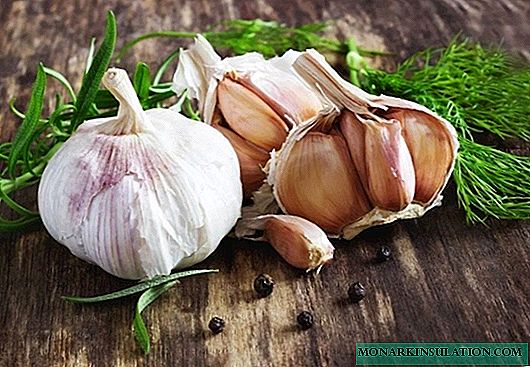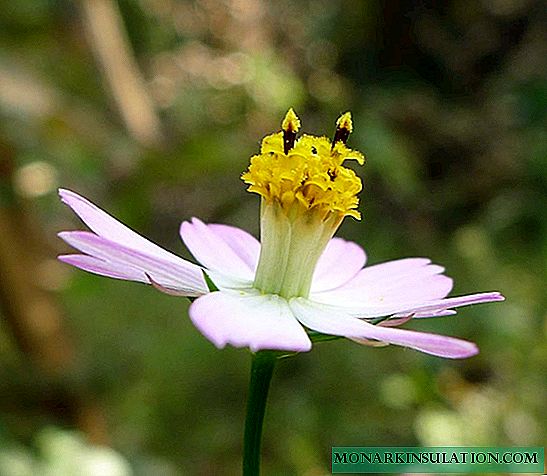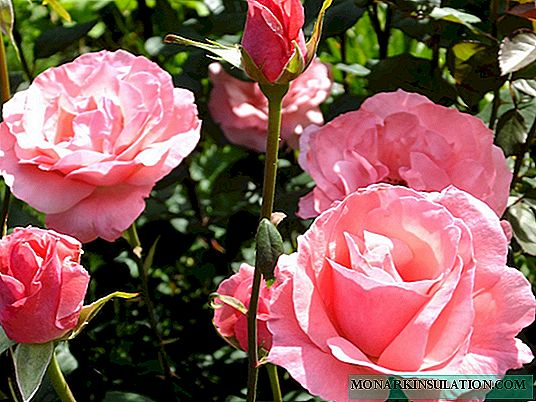Roses, rightfully considered the queens of any garden, can decorate any site or flower bed. It is very annoying when, in the midst of fragrant flowering, they are subjected to mass attack by pests.
Among the insects that infect rose bushes, green caterpillars are quite common. They not only spoil the decorative appearance of the plant, but can also harm and even cause the death of the plant. It is important to know the methods of combating these parasites and to prevent their massive invasion.
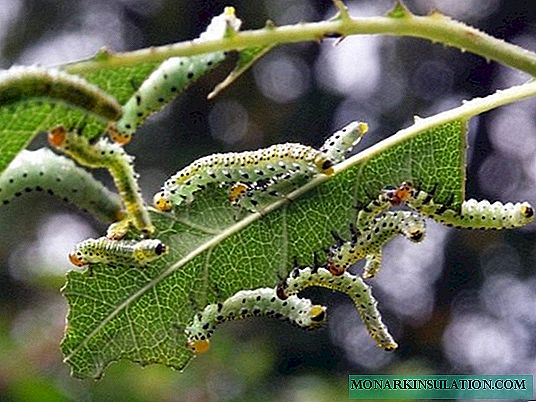
Caterpillars can spoil the appearance of a rose
Why are caterpillars on roses dangerous?
Caterpillars on roses are dangerous for shrubs, as they feed on the flesh of plants and their buds. The result of their stay on the shoots are holes on the foliage. As a result, the shoots and root system begin to receive nutrients with a delay. If untreated, the affected bush loses its shape and often dies.
Note! Most often, parasites are invaded by plants in the shade.
Caterpillars fall on roses from deciduous trees. Their most active period is early spring. Insects begin to devour the petals, spoiling the appearance of the bush. They penetrate into the flowers and eat the buds.
Green Caterpillar Signs
The main sign that the rose has been attacked by caterpillars is the eaten flesh, while the veins remain intact. It can be:
- leaves ate along the edge;
- passages eaten inside the leaf plate and in the stems;
- damaged buds and flowers;
- destroyed stamens and pistils.
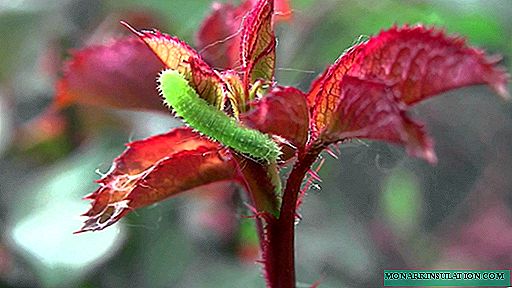
Pests eat pulp and plant buds
Varieties of caterpillar resistant roses
Breeders have bred many varieties of roses that show good resistance to many pests and diseases. To prevent the situation when roses eat green caterpillars, and not think how to process the bushes, you can plant the following varieties:
- Angela
- Westerland;
- Scarlett
- Schneevithen;
- Don Juan;
- Leonardo to Vinci;
- New Dawn;
- Sympathy;
- Freesia.
Prevention of rose bushes from the appearance of caterpillars
It is easier to take care of preventive measures to prevent the emergence of caterpillars on rose bushes than to fight them later. The most effective events:
- Arrangement of traps for butterflies, whose larvae can subsequently infect buds. In early spring they are hung in the garden.
- They will help scare away butterflies and caterpillars with their pungent smell of vodka, ammonia, hot pepper.
- After the buds open, you need to regularly inspect the stems of the plant. This allows you to detect and destroy track laying in time.
- Before opening the buds, the bushes are treated with a solution of Nitrofen, and after that with Bifentrin.
Caterpillars on roses: how to process from chemicals
If the caterpillars eat rose leaves, what to do, gardeners decide, given the mass lesion. There are many chemicals with different effects. They actively fight against larvae and protect against the repeated invasion of insects.
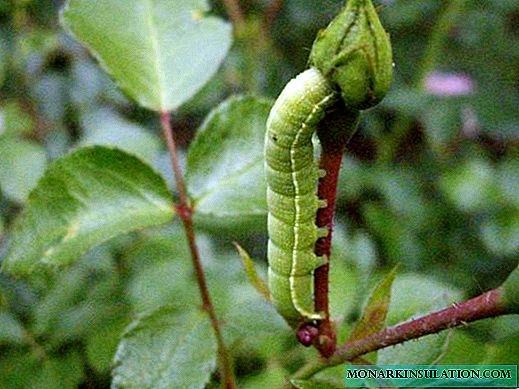
In single cases of damage, you can collect pests manually
Important! When treating plants with chemicals, you must take care of protective equipment: respirators and rubber gloves. At the end of the procedure, wash your hands and face thoroughly with soap and water.
Nitrofen
At the initial stages of the defeat by green caterpillars, spraying with Nitrofen solution is used. Processing is preferably carried out in early spring when larvae appear. The drug will protect the plant from re-invasion for about 2 months.
It is necessary to process the rose bushes themselves and the plants nearby. In 10 l of cold water take 300 ml of the product. Spraying is carried out using a spray or spray gun.
Aktara
This is a broad-spectrum insecticide. It gets inside the leaf plate, therefore it is not washed off by rain and does not evaporate in the sun. 10 g of water will require 8 g of Actara. The substance is active for a month. After this period, processing can be repeated.
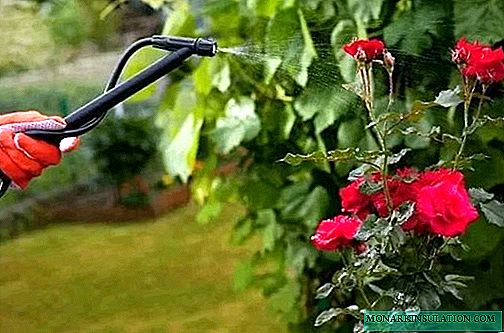
Chemical treatment must be carried out using protective equipment.
Actellic
This is a common remedy for insect pests in both garden and indoor plants. The advantage of the drug is that it can be used at any stage of the growing season. To prepare a working solution, 2 ml of the drug is diluted in 2 l of water. The most active impact on the tracks occurs in the first two hours after spraying.
Actellik is valid for about a month. To prevent the appearance of parasites, rose bushes can be sprayed in late spring - early summer.
Note! To enhance the effect of the action of chemical preparations, it is recommended to process plants in calm, dry weather in the morning or evening hours.
Green caterpillars on roses: how to process it from folk remedies
First of all, especially with a slight lesion, it is advised to conduct manual collection of insects. The more pests, the less effective this method will be.
You can treat the rose bush with folk remedies, which, unlike chemicals, are neither harmful to the plant nor to the human body. They can be used at any time during the plant’s life cycle.
Mustard powder
The substance can simply be scattered on a flower bed or a solution can be prepared from it. For this, dry mustard and ground laundry soap are mixed in water. Spray shrubs with this mixture in dry weather, and then the composition will work for several days. If insects are again detected, the treatment is carried out every 3 days.
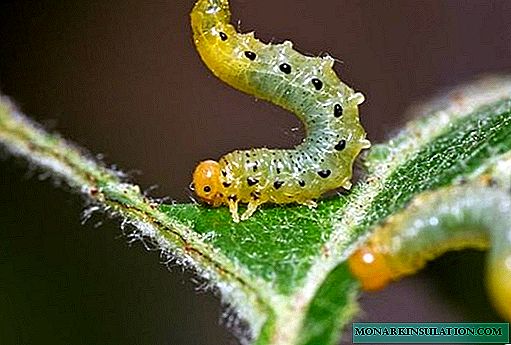
How to treat roses from aphids and caterpillars, gardeners determine the degree of damage to plants
Ash
This remedy is effective in damaging plants with green, black caterpillars, aphids and leafworms. Wood ash is scattered across the flowerbed and thoroughly watered. So the components of the ash fall into the juice of the plant, making it bitter and tasteless for parasites.
You can sprinkle the plant itself - the mixture causes irritation in the caterpillars, so they try to clean up quickly.
Sagebrush
To prepare wormwood infusion, 1 kg of wormwood is poured with 3 liters of water and boiled for 20 minutes. After 2 hours, when the bitter broth is infused, they spray the rose and water the soil around the plant.
Burdock solution
To prepare the product, a third of a bucket of burdock leaves is poured to the top with water and allowed to infuse for 3 days. After the expiration of the term, the infusion is filtered and irrigated with shoots of roses.
Nightshade
An effective remedy for caterpillars is a solanum solution. To prepare it, 5 kg of leaves of the plant are boiled in 10 l of water for 4 hours. Then the hood is filtered and diluted with 4 liters of water. The resulting mixture is treated with roses.
Laundry soap solution
This tool is often used when pests appear on the flowerbed and on domestic plants. Laundry soap is ground on a grater and poured with warm water. After dissolving the pieces of soap with a solution, irrigate the entire affected plant with a spray gun.

In the initial stages of the emergence of caterpillars, you can use folk remedies
Garlic
To combat insects, the greens of young garlic are used. It needs to be filled with water and allowed to infuse for a day. After filtering, the infusion is applied to the entire shrub. Well cope with pests and solutions from onion peel, tops of tomatoes and potatoes.
Caterpillars and other insects on roses cause a lot of problems during the season. They devour the leaves and buds of the plant, interfere with its normal development. Often the invasion of caterpillars causes the death of shrubs.
Important! Each gardener decides how to spray roses from aphids and caterpillars individually, depending on the mass of the lesion and the growing season.
Folk remedies and chemicals help get rid of uninvited guests on roses. In isolated cases, you can resort to the manual collection of insects. Preventive treatment of rose bushes in early spring can significantly reduce the risk of pests.



